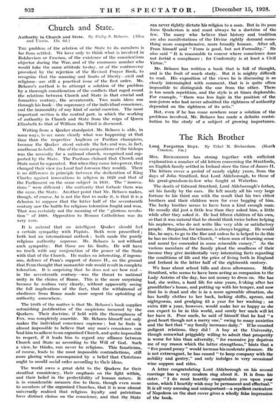Church and State.
Authority in Church and State. By Philip S. Belasco. (Allen and Unwin. 12s. 6d.) Tim problem of the relation of the State to its members is far from settled. We have only to think what is involved in Bolshevism or Fascism, of the existence of the conscientious objector during the War, and of the enormous number who would take the same attitude to-day, or of the controversy
pro- yoked by the rejection of the Revised Prayer Book, to recognize that the meaning and limits of liberty—civil and religious—are still a practical issue of the first order. Mr. Belasco's method is to attempt a solution of the problem by a thorough consideration of the conflicts that raged round the relations between Church and State in that crucial and formative century, the seventeenth. Two main ideas run through his book—the supremacy of the individual conscience, and the immorality of any kind of social coercion. The most important section is the central part, in which the working of authority in Church and State from the reign of Queen Elizabeth to that of William the Third is discussed.
Writing from a Quaker standpoint, Mr. Belasco is, able, in some ways, to see more clearly what was happening at that time than the respective Anglican or Puritan champions, because the Quaker stood outside the lists and was, in fact, anathema to both. One of the main propositions of the bishops was the necessity for a national church, recognized and sup- ported by the State. The Puritans claimed that Church and State must be separated. But when they came into power, they changed their view (as Laud had foreseen they would). There is no difference in principle between the declaration of King Charles against innovations in religion in 1626 and that of the Parliament on the same subject in 1611. The " innova- tions " were different ; the authority that forbade them was the same, the State. Another point that Mr. Belasco makes, though, of course, he is not the first to make it, is that it is a delusion to suppose that the latter half of the seventeenth century saw the battle for religious toleration fought and won. That was certainly not the meaning of the " glorious revolu- tion " of 1688. Opposition to Roman Catholicism was its very core.
It is natural that an intelligent Quaker should feel a certain sympathy with Papists. Both were proscribed ; both had an international outlook ; both made the purely religious authority supreme. Mr. Belasco is not without such sympathy. But those arc his limits. He will have no truck with any conjunction of the power of the State with that of the Church. He makes an interesting, if ingenu- ous, defence of Penn's support of James II., on the ground that Penn thought that monarchic rule would result in complete toleration. It is surprising that he does not see how real— in the seventeenth century—was the threat to -national unity in the claims of Rome. This is the more surprising because he realizes very clearly, without apparently seeing the full implications of the fact, that the withdrawal of obedience from Rome made more urgent the upholding of authority somewhere.
The truth of the matter is that Mr. Belasco's book supplies astonishing justification of the suspicions incurred by the Quakers. Their doctrine, if held with the thorOughneas of Fox, was completely anarchic. Mr. Belasco himself not only makes the individual conscience supreme ; but he finds it almost impossible to believe that any man's conscience can lead him to adhere to an organized Church, and quite impossible to respect, if it leads him to regard any alliance between Church and State as according to the Will of God. Such a view, he thinks, can never be religious. This fanaticism,. of course, leads to the most impossible contradictions, still more glaring when accompanied by a belief that Christians ought to mould social order according to their ideas.
The world owes a great debt to the Quakers for their steadfast consistency, their emphasis on the light within, and their belief in the perfectibility of human nature. It is in considerable measure due to them, though even more to members of the organized Churches, that it is now almost universally realized that religious loyalty and patriotism have distinct claims on the conscience, and that the State can never rightly. dictate his religion to a man. But in its pure form Quakerism is and must always be a doctrine of the few. The many who believe that history and tradition are also manifestations of the Divine rightly demand some- thing more comprehensive, more broadly human. After all, Penn himself said " Form is good, but not Formality." He also said " It is reasonable to concur where conscience does not forbid a compliance ; for Conformity is at least a Civil Virtue."
Mr. Belasco has written a book that is full of thought, and is the fruit of much study. But it is mighty difficult to read. His exposition of the views he is discussing is so closely intermingled with comment, that is is quite often impossible to distinguish the one from the other. There is too much repetition, and the style is at times deplorable. For example,- " there was less logic in the position of the non-jurors who had never admitted the rightness of authority depended on the rightness of its acts."
But, even if he has come nowhere near a solution of the problems involved, Mr. Belasco has made a definite contri- bution to the study of a subject of growing importance.








































 Previous page
Previous page